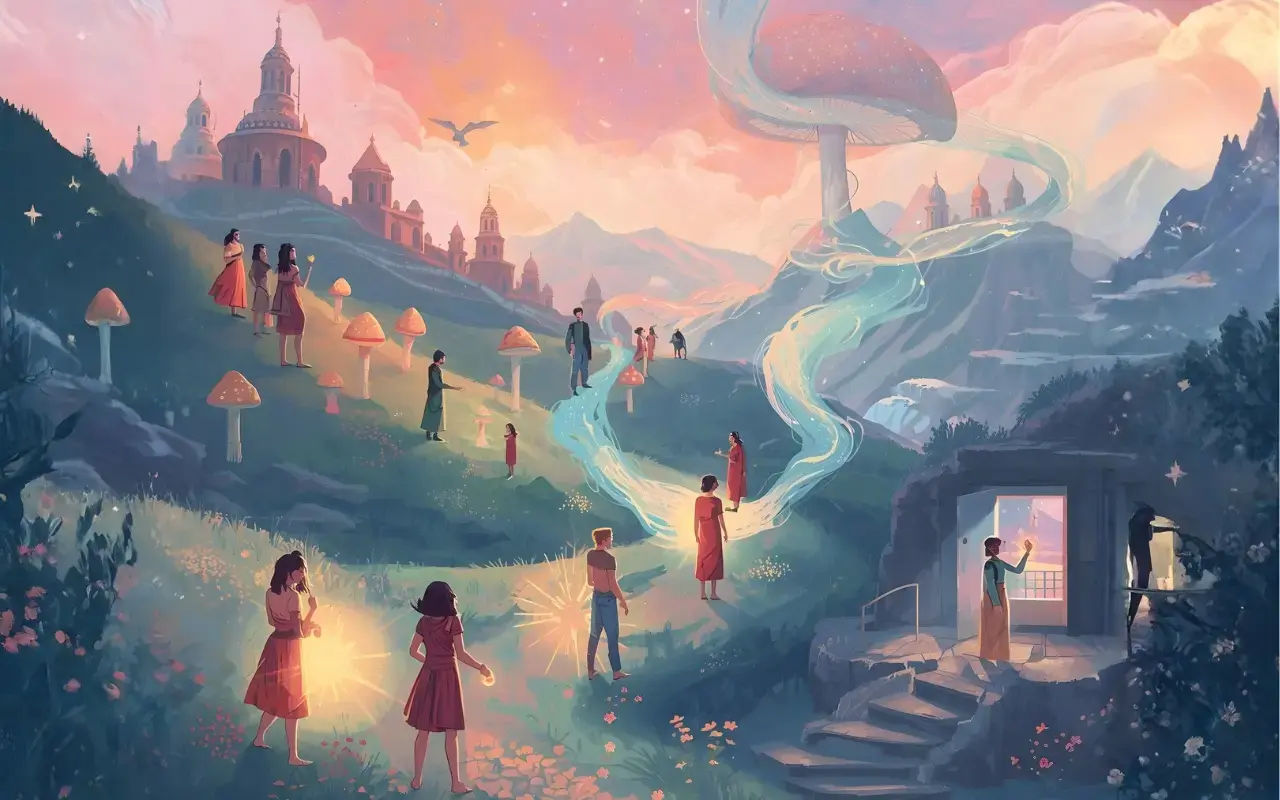Psilocybin’s reputation in mainstream culture has come full circle. This psychedelic compound is now being researched for its healing properties and taken by people from all walks of life to expand their minds. In the 1960s, though, magic mushrooms were taboo, something deadbeats took to get high. Sometimes, that reputation is hard to shake, which is why it’s essential to dig back even deeper, like thousands of years, into the history of psilocybin as part of ancient ceremonies.
At Beckley Retreats, psilocybin ceremonies are approached with reverence and caution, framed by careful preparation and integration. In this piece, we will explore the role of psilocybin in spiritual history, the complexities of its modern use, and the considerations for those drawn to it as a sacred path.
The Sacred Lineage of Psilocybin
Long before Western science honed in on psilocybin, the psychoactive compound found in certain mushrooms and truffles, Mesoamerican cultures regarded these mushrooms as sacred. The Aztecs referred to them as teonanácatl, which translates to ‘flesh of the gods.’ Early Spanish missionaries wrote accounts of ceremonies where mushrooms were consumed as a form of communion.
Historians note that such ceremonies were structured, not casual or simply recreational. Participants sought healing, guidance, or communion with spirits; the mushrooms were part of a larger ceremonial fabric.
It wasn’t until the mid-20th century that the modern West was (re)introduced to psilocybin. In 1957, R. Gordon Wasson’s Life magazine article introduced readers to Mazatec healer María Sabina and her mushroom ceremonies in Mexico. The piece triggered significant Western interest: waves of seekers soon visited her village, and many local observers say this disrupted both the community and the meaningful integrity of the ritual practice. It was an early example of how fascination with Indigenous wisdom can turn quickly into appropriation or exploitation.
The Modern Entanglement of Psilocybin and Religion
In recent decades, psilocybin has re-emerged not only in clinical research and wellness circles but also in explicitly religious contexts. A growing number of so-called ‘entheogenic churches’ frame mushrooms as sacraments. In the United States, some seek protection under the Religious Freedom Restoration Act (RFRA), the same legislation that has enabled certain ayahuasca-using churches, such as União do Vegetal, to operate legally. Yet psilocybin occupies a far more blurred legal space. Outcomes vary by state, and exemptions are rarely clear-cut.
While psilocybin remains prohibited in much of the world, countries such as Jamaica never criminalised it, opening the door for legally sanctioned retreats. For many participants, this clarity is crucial. It provides the opportunity to participate in guided ceremonies without fear of legal repercussions, while also ensuring that facilitators can meet consistent standards for preparation, dosage, and integration.
Journalist Michael Pollan captured the complexity of these boundaries in his essay This Is Your Priest on Drugs. He observed that the lines between therapy, spirituality, and recreation are porous. Even in clinical settings, psychedelic experiences often take on qualities that feel deeply spiritual, such as visions of unity, encounters with the ineffable, moments of revelation that resemble religious epiphany more than medical procedure. Pollan’s work highlights a central idea that psilocybin defies neat categories, demanding a more fluid understanding of human experience.

Pollan also offers a striking window into how deeply personal and unsettling a psilocybin experience can be, especially when that experience stands outside conventional religious frameworks. Describing one participant’s reaction, Pollan writes, “There was neither color nor its absence. There was no form, or its absence. There was not fear. There was not joy. There was not revelation. There was nothing.” Pollan recounts that for this particular participant, the experience was “maybe the hardest thing I had done in my life, something that took me to the furthest limit of human capacity.”
The study Pollan explores, featuring clergy members from across faiths, revealed something remarkable. Ninety-six percent of them ranked their psilocybin experience among the most spiritually significant of their lives.
Ceremony, Safety, and Spiritual Growth
If psilocybin cannot be neatly boxed into “religious” or “therapeutic,” the key distinction lies in its setting and context of use. The ceremonial use of psilocybin is not defined solely by the substance but by the structure that surrounds it, which includes the preparation, intention, guidance, and integration.
This context is central to Beckley Retreats. In Jamaica and the Netherlands—two countries where psilocybin is legal to possess and ingest—participants are led through a carefully designed arc: weeks of preparation, immersive ceremonies with trained facilitators, and six weeks of integration afterwards. This model draws inspiration from Indigenous traditions but adds modern safeguards.
Ceremonies may include breathwork, meditation, or music to deepen introspection. Facilitators, ranging from psychotherapists to spiritual guides, support participants through moments of unity or difficulty alike. Medical screening and supervision provide an additional layer of safety and security.
In this setting, psilocybin becomes a tool for meaning-making. Some experience it as prayer, while others view it as therapy; for most, it is an encounter with questions of purpose, mortality, and connection.
Ethics and Integrity
Too often, Indigenous practices have been borrowed without regard for the communities that sustained them. Respect requires more than symbolic gestures. It means acknowledging the origins of these traditions, giving back materially and culturally, and resisting the temptation to universalise specific and contextual practices.
Modern retreats should not claim to replicate Indigenous ceremonies wholesale, nor position themselves as arbiters of religious truth. At Beckley, the focus is on holding themes of reverence, connection, and meaning in ways that respect both participants and the source of those traditions. This approach creates space for people from diverse backgrounds to engage sincerely, without appropriation.
For those considering psilocybin in a spiritual context, it helps to ask a few questions in advance.
- Is the retreat taking place in a jurisdiction where psilocybin is legal, with medical screening and emergency protocols in place?
- Do the organisers show respect for the lineages they draw from, and practise reciprocity?
- And will there be structured opportunities, such as coaching, sharing circles, or contemplative practices, to integrate the lessons afterwards?
These considerations go beyond safety. They protect the integrity of the experience and distinguish meaningful ceremonial use from opportunistic or unsafe offerings.
Over thousands of years, people have turned to mushrooms to seek the sacred in the natural world. As Pollan reminds us, the categories of religion, therapy, and recreation often obscure more than they explain. When held legally, safely, and with integrity, psilocybin ceremonies can open a space where participants reflect deeply on life’s biggest questions.
For today’s seekers, the challenge is to walk this path responsibly by choosing contexts that are legal and well-supported, respecting history, and carrying insights forward with humility. Beckley Retreats provides a space where ancient wisdom and modern science intersect, and where psilocybin is not merely consumed but honoured in a spiritual and religious context.
Sources
- FungaOnline. (2022, October). Maria Sabina and a brief history of magic mushrooms. FungaOnline. https://fungaonline.com/instead-of-history-of-plant-medicines/#:~:text=Beatniks%2C%20hippies%2C%20celebrities
- Marijuana Moment. (n.d.). Federal judge sides with religious group that uses psilocybin as sacrament, rejecting Utah officials’ request to dismiss lawsuit. Marijuana Moment. https://www.marijuanamoment.net/federal-judge-sides-with-religious-group-that-uses-psilocybin-as-sacrament-rejecting-utah-officials-request-to-dismiss-lawsuit/
- Cato Institute. (2023). Psychedelics, the DEA, and regulating religion. Regulation, Spring 2023. https://www.cato.org/regulation/spring-2023/psychedelics-dea-regulating-religion
- This is your priest on drugs. (2025, May 26). The New Yorker. https://www.newyorker.com/magazine/2025/05/26/this-is-your-priest-on-drugs

Max Stott
-2-1.png)
